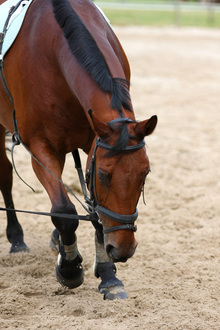Head shaking syndrome is when a horse shakes or jerks its head uncontrollably for no apparent reason. A recent study led by academics from the University of Bristol's School of Veterinary Sciences and the University of Liverpool, evaluated the long-term success rate of a pioneering new surgical procedure, called caudal compression of the infraorbital nerve.

Looking for ways to cure head shaking
Head shaking in horses is a major welfare and health issue and more research is needed to improve medical and surgical therapies.
During the research, platinum coils were placed into the nerve ends within the canal to relieve the pain that caused the head shaking by the horse.The study found this surgery could be a viable option for head shaking in horses with a long-term success rate of nearly 50 per cent. Nonetheless, researchers are continuing work to find a more effective treatment method for head shaking.
The study published in Equine Veterinary Journal evaluated the long-term success rate of caudal compression of the infraorbital nerve, the researchers reviewed clinical records of 58 horses that underwent this surgery between June 2004 and January 2011.
The horses, aged one to 17 years, were used for general riding, show jumping, eventing, or dressage and had a history of head shaking.
The study found:
- Surgery was initially considered a success in 35 of 57 (63 per cent) horses, but head shaking recurred between nine and 30 months later in nine horses;
- The research team repeated the surgery in ten horses;
- The overall success rate at an average follow-up time of 18 months, considering only the response to the last surgery performed, was 49 per cent;
- Owners reported nose rubbing in 30 horses at long-term follow-up after surgery;
- Nose rubbing resolved in all but four horses that were later euthanized.
"Head shaking in horses is a major welfare issue for horses and more research is needed on the aetiopathogenesis of this pain syndrome to improve medical and surgical therapies. Head shaking is a significant cause of distress for some horses and this treatment in selected cases is needed even though the failure rate is limited."
The researchers concluded from their study that the caudal compression procedure offers the best prognosis for a successful outcome compared with other treatments for horses where the only alternative is euthanasia. However, surgical treatment of the disorder needs to be improved together with further research into the causes and development of the disorder.
Learn more about diagnosing your Horse's Health
